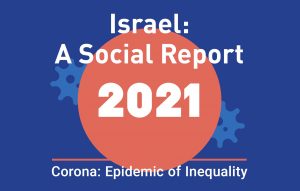This annual Adva Center socio-economic report focuses on the effect of the corona crisis on three population groups and illuminates a number of other factors relevant to the crisis
The Top One Percent in Times of Corona: Like many of their counterparts in Europe and America, the top one percent in Israel was not adversely affected by the crisis. The Bank Credit Suisse Wealth Report states that in 2020, there were 157,286 millionaires in Israel – a negligible decrease of 0.1% since 2019. The average wealth of Israeli millionaires – reported as 3.33 million dollars – remained stable.
Israel’s top one percent received the most expeditious state protection and benefits. The Bank of Israel supported big corporations by purchasing 15 billion NIS worth of corporate bonds. This aid contributed to the fact that while the real economy shrunk, the Tel Aviv 90 Index increased by some 18% in value during the first year of the corona epidemic.
The government exempted the wealthy from the burden of participation in financing the costs of the corona crisis. Israel expended an estimated NIS 137.3 million on aid to businesses and citizens. As this sum was not budgeted, it increased the budgetary deficit and the national debt. The Netanyahu-Gantz coalition did not consider raising taxes, despite Bank of Israel declarations that tax increases were unavoidable.
If tax increases are not imposed on the wealthy, such increases will either fall to the lot of the middle class or, alternatively, result in the privatization or reduction of public services – moves that will hurt middle and low-income families. In light of these possibilities, the report recommends imposing a wealth tax.
Hi Tech in Times of Corona: Like its ultra-rich, Israel’s hi tech sector has not been adversely affected by the corona epidemic. In fact, the hi tech sector continued to grow despite the corona crisis. For example, the financial newspaper The Marker reported in January 2021 that “the 13,500 hi tech workers employed in the ten largest technology companies listed on the stock exchange gained no less than 2.5 million dollars in income.”
Small Businesses in Times of Corona: Small businesses are the main reason for the increase in employment in the Israeli economy that occurred over the past two decades and the concomitant decrease in unemployment. While the businesses in question are small, together they constitute the largest employer in the Israeli economy. In 2018, small and medium sized businesses accounted for 1.92 million employee posts, or 60% of the 3.17 million posts in the private sector.
Small businesses were the main losers in the corona crisis, primarily service providers, many of whom had become upwardly mobile due to increased consumption in the decades preceding the crisis. In 2020, private per capita consumption in Israel decreased by 11.1%, more than the average in OECD countries – 6.3%.
Dun and Bradstreet estimated that in the first half of 2020, 37,600 Israeli businesses shut down, among them 1,550 restaurants, bars and coffee shops; more than 1,000 construction and renovation firms; some 600 transportation companies; and 450 clothing shops. Their estimate was that by the end of the year, 80-85 thousand businesses would close down – an increase of 85% over 2019.
The chief economist of the Israel Ministry of Finance estimated in May 2020 that 54% of workers furloughed were employed in small businesses.
Food Insecurity in Times of Corona: The highest proportion of persons reporting food insecurity during the corona epidemic was found among Arab citizens of Israel. In April 2020, 23.5% of Arabs reported that they or members of their family had reduced the amount of food or the number of meals during the previous week, compared with 14.1 % among persons in the general population of Israel aged 21 and over.
Inequality in Health in Times of Corona: Israelis of low socio-economic status sickened more than Israelis of high socio-economic status, among other things due to the higher incidence of health risk factors like high blood pressure and diabetes among them.
The corona epidemic threatens everyone, but the threat is especially acute for persons whose living conditions promote contagion. Housing density and household size are larger among Haredi Jews and Arab citizens of Israel than among others, resulting in greater susceptibility to infection from the virus.
Another factor influencing the rate of illness from the corona virus is the sense of alienation of these same two population groups from the central government of Israel and its institutions, resulting in indifference or non-compliance with official instructions issued as to how to keep safe from contagion.
The result: the death rate of Arab citizens of Israel aged 60 and older from the corona virus was three times that of non-Haredi Jews; and the death rate of Haredi Jews four times that of non-Haredi Jews.
Mental Health in Times of Corona: The corona epidemic has had an adverse effect on the mental health of Israelis. During the first lockdown, about one-third (34%) of persons aged 21 years and over suffered from tension and anxiety. That proportion rose to 42% when the lockdown was lifted in July 2020. In November 2020 the proportion decreased to 37% — still quite high. Those reporting the greatest suffering from tension and anxiety were women and Arab citizens.
Feelings of loneliness and depression were revealed by the Citizen Resilience Survey conducted by the Israel Central Bureau of Statistics, which showed that in April 2020, 30% of interviewees aged 65 and over reported loneliness and 19% reported depression, compared with 24% and 16%, respectively in the general population.
Housing in Times of Corona: Before the outbreak of the epidemic (2018), Israeli households from the bottom income decile living in rental housing expended 54% of their disposable income on rent and related outlays. For households in the second lowest income decile, that expenditure constituted 34% of their disposable income; in both cases, housing expenditure was higher than the 30% considered the maximum households should have to pay for housing. The economic hardships of the epidemic for households residing in rented housing led to an increase in requests for rent assistance, along with an increase in the number of eligible households waiting for public housing units.
While the economic crisis accompanying the corona epidemic had an adverse effect on renters as well as on home owners with mortgage payments to meet, the benefits given by the government in the area of housing were directed not to them but rather to persons purchasing housing units as investments. With the expressed purpose of stimulating business in the real estate sector by incentivizing investors, in July 2020 the purchase tax for investors was reduced, thus abrogating the increase made in 2015 to discourage real estate investments in favor of the purchase of own homes.
The full report is available in Hebrew here
// The report was produced in cooperation with the Friedrich Ebert Stiftung, with support from MAZON: A Jewish Response to Hunger and The New Israel Fund






